- Home
- Beth Vrabel
A Blind Guide to Stinkville
A Blind Guide to Stinkville Read online
Praise for Beth Vrabel and Pack of Dorks:
“Debut author Vrabel takes three knotty, seemingly disparate problems—bullying, the plight of wolves and coping with disability—and with tact and grace knits them into an engrossing whole of despair and redemption. . . . Useful tips for dealing with bullying are neatly incorporated into the tale but with a refreshing lack of didacticism. Lucy’s perfectly feisty narration, emotionally resonant situations and the importance of the topic all elevate this effort well above the pack.”
—Kirkus Reviews, starred review
“Lucy’s growth and smart, funny observations entertain and empower in Vrabel’s debut, a story about the benefits of embracing one’s true self and treating others with respect.”
—Publishers Weekly
“Vrabel displays a canny understanding of middle-school vulnerability.”
—Booklist
“Lucy’s confident first-person narration keeps pages turning as she transitions from totally popular to complete dorkdom in the space of one quick kiss. . . . Humorous and honest.”
—VOYA
“This book doesn’t soft-peddle the strange cruelty that kids inflict on one another, nor does it underestimate the impact. At the same time, it does not wallow unnecessarily. . . . The challenging subject matter is handled in a gentle, age-appropriate way with humor and genuine affection.”
—School Library Journal
“Pack of Dorks nails the pitfalls of popularity and celebrates the quirks in all of us! An empowering tale of true friendships, family ties, and social challenges, you won’t want to stop reading about Lucy and her pack . . . a heartwarming story to which everyone can relate.”
—Elizabeth Atkinson, author of I, Emma Freke
“A book about all kinds of differences, with all kinds of heart.”
—Kristen Chandler, author of Wolves, Boys, and Other Things That Might Kill Me and Girls Don’t Fly
“Beth Vrabel’s humorous debut, Pack of Dorks, takes a fresh look at what it means to embrace what makes you and the ones you love different. . . . The novel is a must read for anyone trying to survive fourth grade or anyone who remembers what it was like. Pack of Dorks is the pack I want to join.”
—Amanda Flower, author of Agatha Award nominee Andi Unexpected
“Beth Vrabel’s stellar writing captivates readers from the start as she weaves a powerful story of friendship and hardship. Vrabel’s debut novel speaks to those struggling for acceptance and inspires them to look within themselves for the strength and courage to battle real-life issues.”
—Buffy Andrews, author of The Lion Awakens and Freaky Frank
“Beth Vrabel weaves an authentic, emotional journey that makes her a standout among debut authors.”
—Kerry O’Malley Cerra, author of Just a Drop of Water
Also by Beth Vrabel
Pack of Dorks
Copyright © 2015 by Beth Vrabel
All rights reserved. No part of this book may be reproduced in any manner without the express written consent of the publisher, except in the case of brief excerpts in critical reviews or articles. All inquiries should be addressed to Sky Pony Press, 307 West 36th Street, 11th Floor, New York, NY 10018.
Sky Pony Press books may be purchased in bulk at special discounts for sales promotion, corporate gifts, fund-raising, or educational purposes. Special editions can also be created to specifications. For details, contact the Special Sales Department, Sky Pony Press, 307 West 36th Street, 11th Floor, New York, NY 10018 or [email protected].
This is a work of fiction. Names, characters, places, and incidents are either the products of the author’s imagination or used fictitiously.
Sky Pony® is a registered trademark of Skyhorse Publishing, Inc.®, a Delaware corporation.
Visit our website at www.skyponypress.com.
10 9 8 7 6 5 4 3 2 1
Library of Congress Cataloging-in-Publication Data
Vrabel, Beth.
A blind guide to Stinkville / Beth Vrabel.
pages cm
Summary: Leaving her best friend and the familiarity of Seattle for the paper mill town of “Stinkville,” South Carolina, twelve-year-old Alice, who lives with albinism and blindness, takes on the additional challenge of entering the Stinkville Success Stories essay contest.
ISBN 978-1-63450-157-6 (hardback)
[1. Albinos and albinism--Fiction. 2. Blind--Fiction. 3. People with disabilities--Fiction. 4. Self-reliance--Fiction. 5. Moving, Household--Fiction. 6. City and town life--South Carolina--Fiction. 7. South Carolina--Fiction.] I. Title.
PZ7.V9838Bl 2015
[Fic]--dc23
2015011256
Cover design by Laura Klynstra
Cover image credit Shutterstock
Print ISBN: 978-1-63450-157-6
Ebook ISBN: 978-1-63450-917-6
Printed in the United States of America
To my family. And Chuck.
Chapter One
Even I could see that Tooter was no Seeing Eye dog.
The ancient Shih Tzu was about the size of a loaf of bread. His bottom teeth poked out of his mouth all the time. His eyes were once brown but now they were sort of gray. Tooter’s favorite thing in the world to do was to rub his butt against the ground. Or the table. Or someone’s leg. And to fart. And that’s the story behind the name Tooter.
After Mom finally agreed that my brother, James, could walk me to the library instead of making me spend another summer day alone at home (I mean, I guess, technically, it’s home, even though it doesn’t feel like it yet), he grabbed Tooter’s leash from a hook by the door.
“Come on, Alice. Might as well take care of two needy pains-in-the-butt,” he muttered.
We moved to Sinkville, South Carolina, about three months ago. Sinkville is the official name, but everyone calls it Stinkville.
Home, I mean real home, is Seattle, Washington. We lived there, right along the shore, all twelve years of my life. There was always a wonderful blanket of soft gray in the sky, so I only had to put on sunscreen once in the morning and my milk-white skin stayed perfectly pale. The air smelled salty and like rain. Mom would walk me to school during the school year, and I’d spend the summer hanging out with my best friend, Eliza, who lived a block from us. Her mom let her walk over to our house by herself in the morning, but of course it was impossible for me to head out on my own. So we’d always hang out at my home. Mom would bake us cookies and tell us stories about her life B.A. (before Alice), when she was a travel writer. She made every day feel like an adventure. Sometimes when Dad came home from work, he’d say, “Where’d ya go today, Alice?” And I’d say anything from Argentina to Zaire, wherever Mom had talked about that day.
Here in Stinkville, life is pretty much the opposite of before. We live in a little house in the middle of the woods. Even with all the trees, the sky is blazing blue. I have to put on sunscreen every other hour. For real. And the air in Stinkville? It smells like rotting eggs. That’s because the whole town is centered on M. H. Bartel Paper Mill, where almost everyone (including the new plant manager, a.k.a. my dad) in town works.
Do you know how paper is made? I don’t either. But I do know it involves purposefully rotting wood. Rotting wood emits incredibly horrible smells. The scariest part: no one in town even smells it anymore. For real. So if we live in Stinkville long enough we’ll get used to the stink and we won’t even know how horrible it is to new people!
And if that wasn’t stinktastic enough, Mom doesn’t walk me to school or anywhere for that matter. Mostly that’s because we moved in the summer, so there is no school. But also because the longer we live here, the less Mom does anything Momish. She took me to the libra
ry the first week we were here but has been “too tired,” “feeling a little overwhelmed,” or “grrrmmlll” (the approximate sound she makes when I nudge her awake), since. She doesn’t even tell me to brush my teeth anymore, let alone explain what happened when she went diamond mining in Tanzania years ago.
But what about hanging out all day with my BFF? Well, she’s literally across the country. And I’m here. With no friends. No life. My only excitement now is going to M. H. Bartel Public Library (yup, even the library was named after the paper mill).
When James, Tooter, and I got to the library doors, I stomped and refused to go inside without my brother.
“What is your deal?” he hissed. “I said I’d take you to the library, not hold your books for you.”
“I can’t go by myself.” I stomped again.
“Why not?”
I glared at him.
“Are you playing the blind card?” he sighed.
“I’m not playing,” I snapped. “I’m actually blind. And you have to help me.”
“I don’t have to do anything,” James snapped back. But he looked around for someplace to tie Tooter’s leash.
“Do you think it’s okay to leave him out here?” I muttered. I mean, it was about a thousand degrees out. Under my enormo sunhat, my sweaty hair felt wet, as if I had just left the shower. Tooter’s little pink tongue hung out of his mouth and almost touched the sidewalk.
“Urgh!” James jerked open the door to the library and stepped in, dragging Tooter along by the leash.
The cool fresh air hit my face as we walked inside and I breathed as deeply as I could. My glasses turn to sunglass lenses when I’m outside, so for a minute I was even more blind than usual while the lenses adjusted.
“Excuse me!” a high-pitched voice that seemed to come out of the speaker’s nose rather than her mouth called out. “We do not allow animals in here. This. Is. A. Library!”
As my lenses transitioned, I could make out a huge desk in front of us. Behind it, I saw a bright red blur that I think was the speaker’s shirt and a fluffy mound of yellow, which had to be her hair.
“I’m sorry,” James said. “It’s just, I’m bringing my sister here. I had to actually bring her in because she’s blind . . .”
“Oh!” The librarian sucked in her breath. I went ahead and rolled my eyes, figuring the person behind the desk was a) Not looking at me, and b) Not able to see behind my dark lenses anyway.
Where we used to live, everyone knew I was blind. It wasn’t a big deal. It was accepted, the same way everyone accepted that Josh’s mom always was last to pick him up from playdates and that Eliza’s hair was too curly to lie flat around her face.
But here, being blind is news. And this is the way it goes when people find out about me: they gasp. Then, if I’m close enough, I’ll see this awful expression on their faces, like they just ate some bad cheese but are holding it in their mouths instead of spitting it out. Then they become overly helpful, usually asking the person I’m with what they can do to help instead of asking me. They also speak super loudly, like maybe I’m also deaf. No one ever asks me questions.
If they did, I’d be able to explain.
So you’ve heard of 20/20 vision being normal? I’m 20/200 in my left eye, 20/210 in my right. So a “normal” person could read something from two hundred feet away that I’d have to be twenty feet from in order to read. I know, I know. You’re making the bad cheese face for me. Please stop. The point is: I can read. I just have to be really close.
Soon after making the gaspy voice, the librarian came out from behind the desk. My lenses were clearing up. She stood way too close to me, so I could make out that her lipstick was gloppy and pink, and that her yellow hair was gray at the roots. She smelled like lavender mixed with a little rotting eggs. I wonder if that was the paper mill stink on her.
“I am Mrs. Dexter,” the librarian said, slowly and loudly.
James snickered beside me, quickly turning it into a cough.
“I’m Alice,” I answered.
She stared hard at my eyes, which made me nervous. And that, in turn, made my eyes move faster. So I guess I should just go ahead and say it. I’m blind because I have albinism. You know, like an albino. It just means my skin is about the color of paper, my hair is, too, and my eyes are blue. Everyone who has albinism is visually impaired. We have something called nystagmus, which makes our eyes always move back and forth. A lot of albinos aren’t blind like me, though; they are just visually impaired.
“Service animals are welcome in the M. H. Bartel Library, as are any individuals with special needs. Welcome, Alice.” Mrs. Dexter said all of this with long. Pauses. Between. Each. Word. “Welcome,” she said again.
James now openly grinned at me. He handed me Tooter’s leash. The dumb dog was scooting his butt along the carpet but seemed a little peppier in the air-conditioned building.
“Text me when you’re ready for me to pick you up,” James said. The traitor turned to leave.
“Wait!” Mrs. Dexter stole my line. “Does the Seeing Eye dog know where the large print section is or do I need to tell it?”
“Oh, he’ll figure it out,” James answered, and all three of us looked down at Tooter, who took the opportunity to sniff his own butt with one stubby leg in the air. “Just let Tooter dig right in.”
“Well, Tooter,” Mrs. Dexter patted Tooter’s head. “Let me know if you need anything.”
“Where’s the children’s section?” I asked.
Mrs. Dexter seemed surprised that I spoke. “It’s to the left.” Tooter glanced up at her, so she pointed in that direction. “But we don’t have Braille children’s books here . . .”
“Actually, I can read,” I said, walking purposefully to the left. “I just need to get closer.” And I think it all would’ve made a good impression on Bad Cheese Face Librarian had I not tripped.
Ah! The children’s section. I stopped at the entranceway and breathed in the smell of books and chaos. From the back of the vast room, I heard giggles and chattering as a preschool program let out. Beside me to the right, tables were set up. And all in front of me, rows and rows and rows of books. Someday I’m going to have a library in my own house. I think I could go ahead and skip the living room and just put in a reading room, with piles of books where the television should be.
Tooter pushed ahead of me and jumped onto a chair that was shaped like an open hand. I scooped him up and sat down in his place, holding him to my lap. The chair was pretty cool but it felt a little strange to be leaning back on a thumb. I reached out, grabbed a book at random, and opened it. I think I would’ve read the dictionary at that point; I was just so happy to be someplace comfortable. And, just so you know, I can read regular books. I just have to hold the book a couple inches from my face and hope there aren’t italics. Nystagmus makes a mess of italics. I use a magnifier to help me read, too. It’s small and sort of looks like a credit card, so I simply keep it in my back pocket.
“Um, you’re not actually allowed to bring pets in here.” I glanced over the cover of the book, which ended up being Because of Winn-Dixie, in the direction of the voice. “That’s the rule, even if you are reading a dog book.”
In front of me was a girl about my age, maybe eleven or twelve. Her arms were crossed and her voice was super quiet, maybe because we were in a library, but mostly she seemed like the type to always have a quiet voice.
She leaned forward to rub Tooter’s fluff-ball head. The girl’s dark brown skin made my milky white skin look even more like Oreo stuffing. Tooter tilted his head into her hand and let his tongue roll out of his open mouth. “Kate DiCamillo, the author of your book, writes that it’s hard not to fall in love with a dog with a great sense of humor,” she said with a slight laugh.
“He’s my Seeing Eye dog,” I said.
The girl laughed. “Sure he is.”
I smiled back. “The lady up front fell for it. So now Tooter is here . . .”
“Mrs. Dexter
isn’t all there, you know what I mean?” The girl twirled her finger next to her ear and then sat in the other hand chair next to mine. “I’m Kerica, by the way. My mom’s the children’s librarian. She’s going to freak when she sees your dog in here. I want a dog so bad, but she keeps saying no.”
“I’m Alice. I just moved here a few weeks ago.”
“I figured,” Kerica said. “It’s a small town. Someone new sticks out.”
“They stand out even more if they’re an albino.”
Kerica snorted. Then she bit her lip and smashed her lips together so hard that I snorted, too. “I’m sorry!” she gasped. “I didn’t mean to laugh. But it was just so—”
“Obvious?” I laughed. Soon we were both giggling.
In just a few minutes, I learned a lot of things. First, Kerica spends every summer day, all day, in the library with her mom. She’s read about forty books already and it was only the end of June!
“Most of them are dog books,” she said, and shrugged in a sad sort of way, which I immediately got. Everyone knows dog stories are a downer. “When I’m tired of reading, I draw pictures of the characters.” She flipped open the notebook she was holding and held it up for just a second. I pretended I could see the drawing.
Second, Kerica asks direct questions but they don’t feel rude. Like when she asked me if everyone in my family has albinism (nope, just me) and then said, “That must feel a little lonely.” That could’ve made me feel sad, but it didn’t. It made me feel like she understood.
“Is that a dog in my library?” a booming voice called out.
Kerica kept on rubbing Tooter’s head, who had abandoned my lap for hers the second Kerica had sat down. “Simmer down, Ma. It’s a Seeing Eye dog.”
Kerica’s mom stood in front of me, her arms crossed. She looked so much like a bigger, softer version of Kerica that I had to smile. She watched the two of us for a long moment. “Does Mrs. Dexter know about this animal in here?”
I nodded. “If it helps, I really am blind.”

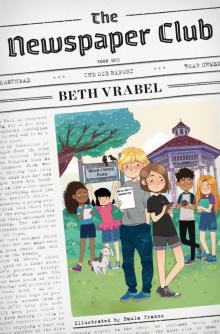 The Newspaper Club
The Newspaper Club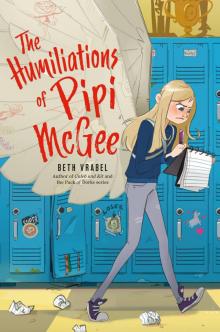 The Humiliations of Pipi McGee
The Humiliations of Pipi McGee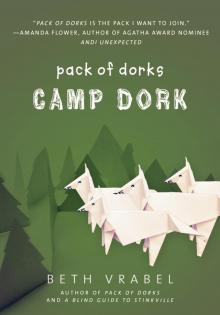 Camp Dork
Camp Dork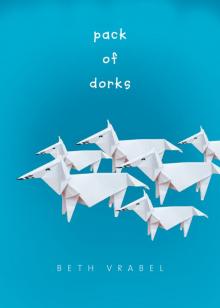 Pack of Dorks
Pack of Dorks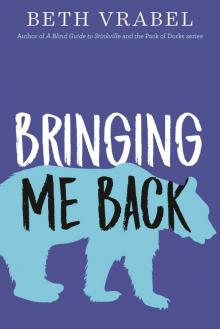 Bringing Me Back
Bringing Me Back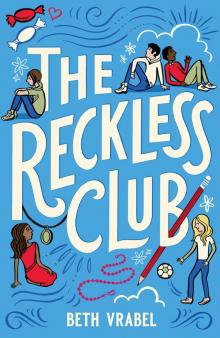 The Reckless Club
The Reckless Club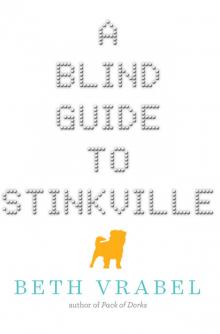 A Blind Guide to Stinkville
A Blind Guide to Stinkville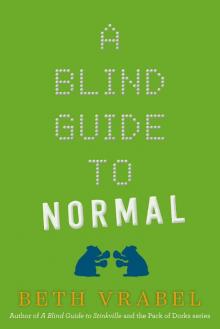 A Blind Guide to Normal
A Blind Guide to Normal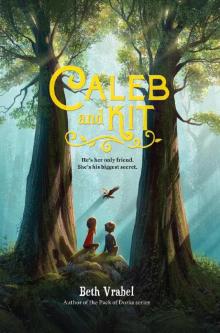 Caleb and Kit
Caleb and Kit